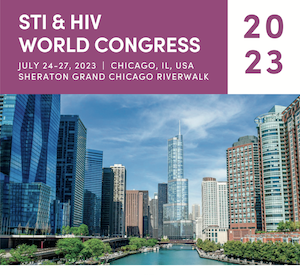-
Tuesday, Jul 25th10:30 - 10:45 CSTO1.3 - Increasing rates of non-albicans Candida species and fluconazole resistant Candida albicans in women with recurrent vulvovaginal candidiasis in a UK regionLocation: Chicago 8Primary Presenter: Jennifer CL Ratner, MSc – The Leeds Teaching Hospitals NHS TrustClinical Science
-
Tuesday, Jul 25th10:30 - 10:45 CSTO3.3 - Detection of Treponema pallidum at asymptomatic oral, anal and vaginal sites in men and women reporting contact with syphilis.Location: Chicago 10Primary Presenter: Ei T. Aung, MBChB (she/her/hers) – Melbourne Sexual Health Centre, The Alfred Health , Melbourne, VictoriaClinical Science
-
Tuesday, Jul 25th11:15 - 11:30 CSTO1.6 - Spontaneous resolution and treatment outcomes in men with Trichomonas vaginalis infectionLocation: Chicago 8Primary Presenter: Christina A. Muzny, MD, MSPH (she/her/hers) – Division of Infectious Diseases, University of Alabama at BirminghamClinical Science
-
Tuesday, Jul 25th11:15 - 11:30 CSTO3.6 - Rapid Plasma Reagin (RPR) sero-reversion after treatment and its association with Prior Treponema Pallidum infection: analysis from the PICASSO cohort among people with early syphilis in PeruLocation: Chicago 10Primary Presenter: Edward Michael Reyes-Diaz, Sr., MD, Ms(c) (he/him/his) – Centro de Investigación Interdisciplinaria en Sexualidad, SIDA y Sociedad, Universidad Peruana Cayetano HerediaClinical Science
-
Tuesday, Jul 25th15:30 - 15:45 CSTO4.5 - Efficacy of minocycline for the treatment of Mycoplasma genitaliumLocation: Chicago 8Primary Presenter: Lenka A. Vodstrcil, PhD (she/her/hers) – Monash University and Melbourne Sexual Health CentreClinical Science
-
Tuesday, Jul 25th15:30 - 15:45 CSTO5.5 - Pritelivir for the treatment of resistant HSV infections in immunocompromised patients: update on an ongoing Phase 3 trial and Early Access ProgramLocation: Chicago 9Primary Presenter: Alexander Birkmann, PhD – AiCuris Anti-Infective Cures AGClinical Science
-
Wednesday, Jul 26th10:15 - 10:30 CSTO7.2 - Routine Pharyngeal Gonorrhea Test-of-Cure: Does It Detect Treatment Failures?Location: Chicago 8Primary Presenter: Laura A. S Quilter, MD, MPH (she/her/hers) – U.S. Centers for Disease Control and PreventionClinical Science
-
Wednesday, Jul 26th10:30 - 10:45 CSTO7.3 - The impact of near-to-patient testing of sexually transmitted infections on clinical practice and antimicrobial stewardship: the NEPTUNE studyLocation: Chicago 8Primary Presenter: Lenka A. Vodstrcil, PhD (she/her/hers) – Monash University and Melbourne Sexual Health CentreClinical Science
-
Wednesday, Jul 26th11:00 - 11:15 CSTO8.5 - Validation of an Easy to Administer Algorithm to Define Penicillin Allergy Status in STI Clinic OutpatientsLocation: Chicago 9Primary Presenter: Rebecca A. Lillis, MD – Louisiana State University Health Sciences Center, New OrleansClinical Science
-
Wednesday, Jul 26th14:45 - 15:00 CSTLB2.2 - Does screening for Neisseria gonorrhoeae and Chlamydia trachomatis affect the incidence of these infections in MSM taking HIV-PrEP? Results from a randomized, multicenter, controlled trialLocation: Michigan A+BPrimary Presenter: Thibaut Vanbaelen, MD – Institute Of Tropical Medicine, Antwerp, BelgiumClinical Science
-
Thursday, Jul 27th10:30 - 10:45 CSTO15.3 - Do we understand rectal chlamydia infections in women? A study including different anatomical sites, quantification and viability of Chlamydia trachomatis in two Swedish STI-clinicsLocation: Sheraton 1Primary Presenter: Mimmi Wänn – Department of Clinical Microbiology, Uppsala University Hospital, Uppsala, SwedenClinical Science
-
Thursday, Jul 27th11:00 - 11:15 CSTO13.5 - Characteristics of mpox positive, versus mpox negative, and mpox unsuspected clients from the Centre of Sexual Health, Public Health Service of Amsterdam, 20 May to 15 September 2022Location: Michigan A/BPrimary Presenter: Henry de Vries, Md PhD – Public Health Service Amsterdam and Amsterdam University Medical CentreClinical Science
-
Thursday, Jul 27th11:15 - 11:30 CSTO13.6 - Rectal and Pharyngeal Mpox PCR Testing of Men Who Have Sex with Men (MSM) Suggests that Rectal Testing is More Sensitive than Lesion Testing and that Most Infections Are AsymptomaticLocation: Michigan A/BPrimary Presenter: Matthew R. Golden, MD, MPH – University of WashingtonClinical Science

